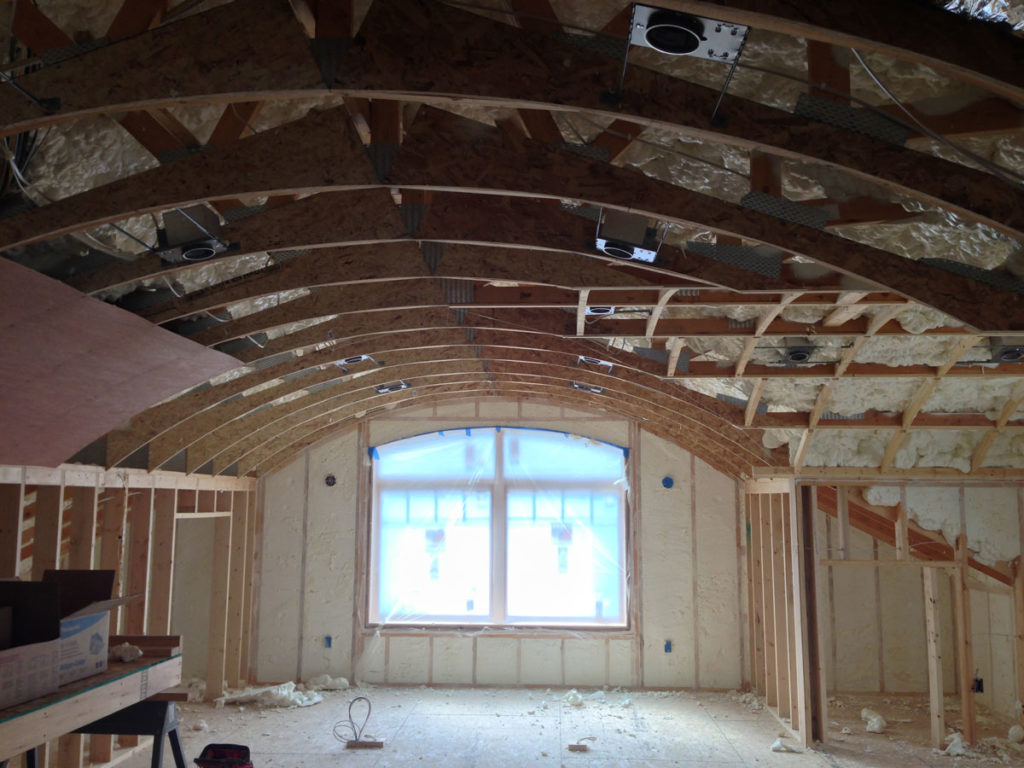Is it time for new insulation? Whether you’re remodeling an old home, or building a new one, you should consider your insulation needs. If it’s been about twenty years since the insulation in your home has been replaced, then it’s probably time for some new stuff. Additionally, it’d be a shame to build a new home without considering all your options before jumping into the insulation stage. If you’re not sure which material you would like to use, let’s talk about spray foam insulation!
What is Spray Foam Insulating?
If you’re investing in new insulation for your home, then you definitely want to make sure you’re getting what’s best for your needs, your home, and your budget. Depending on your answers to those three questions, you might consider spray foam insulation. The material is a result of two liquids—polyol resin and isocyanate—are combined. Mixed together, they create an air-sealing, polyurethane foam (Paragon Protection) that is extremely durable once dried. It’s especially great for areas of your home where other, more traditional forms of insulation may not be as effective, such as roofs, attics, windows, doorways, etc.
What are the pros and cons of spray foam insulating?
Of course, before investing in anything, it’s important to consider the potential benefits and negative consequences. Here are some potential pros and cons of spray foam insulation:
Pros of spray foam insulation
- Increased energy efficiency and lower utility bills
- Improved indoor air quality
- Enhanced temperature regulation and comfort
- Added structural strength to walls and roofs
- Reduction in noise pollution
- Prevention of mold and moisture issues
Cons of spray foam insulation
- Initial investment is expensive
- Professional installation is highly recommended
- DIY installations can come with potential health risks
- Hard to modify or remove
Many of the cons come down to whether or not the insulation was properly installed. So, if you’re hoping to install new insulation yourself, then spray foam insulation may not be the best option for you/
Common questions regarding spray foam insulation
1. How Does Spray Foam Insulation Work?
Spray foam insulation is sprayed onto the surface that needs insulation and then expands, filling gaps and creating a continuous barrier that prevents air and moisture infiltration. This results in improved thermal resistance (R-value), air-sealing, and energy efficiency.
2. Are there different types of spray foam insulation?
Yes, there are two main types: open-cell and closed-cell spray foam. Open-cell foam is less dense, more flexible, and provides good soundproofing. Closed-cell foam is denser, provides a higher R-value, and offers better moisture resistance.
3. Is Spray Foam Insulation Safe?
When properly installed by professionals, spray foam insulation is safe. It is essential to ensure proper ventilation during installation and allow the foam to cure completely before occupying the space. Once cured, it does not release harmful chemicals.
4. How Long Does Spray Foam Insulation Last?
Spray foam insulation can last for decades when properly installed. It does not sag or settle over time, maintaining its effectiveness throughout the life of the home.
5. Can Spray Foam Insulation Be Installed in Existing Homes?
Spray foam insulation can be installed in both new and existing homes. It is particularly useful for retrofitting older homes to improve energy efficiency, comfort, and structural strength.
6. How Much Does Spray Foam Insulation Cost?
Spray foam insulation is generally more expensive upfront compared to traditional insulation materials like fiberglass or cellulose. However, the long-term energy savings and other benefits often outweigh the initial cost.
7. Can I Install Spray Foam Insulation Myself?
While DIY Spray Foam Insulation kits are available, it is recommended to have it installed by professionals. Proper installation is crucial to ensure safety and effectiveness, and professionals have the necessary equipment and expertise.
8. Does Spray Foam Insulation Help with Soundproofing?
Yes, especially open-cell spray foam, which can help reduce noise transmission by creating a noise-muffling barrier. Closed-cell foam also provides some soundproofing, although its primary benefits are thermal insulation and moisture resistance.
9. Will Spray Foam Insulation Affect My Roof?
When properly installed, spray foam insulation should not damage your roof. In fact, closed-cell spray foam can add structural strength to your roof. However, it is essential to ensure proper ventilation to prevent moisture buildup.
10. Will spray foam insulation improve my home’s indoor air quality?
Yes, by creating an airtight seal, spray foam insulation reduces the infiltration of allergens, pollutants, and outdoor air, leading to improved indoor air quality. It also helps prevent mold growth by controlling moisture.
Getting started with Northstar Insulating
Our team is comprised of experts ready to get your home fitted with new insulation. All it takes is getting an initial inspection set up so we can get an idea of what you need. Contact us to get started!

